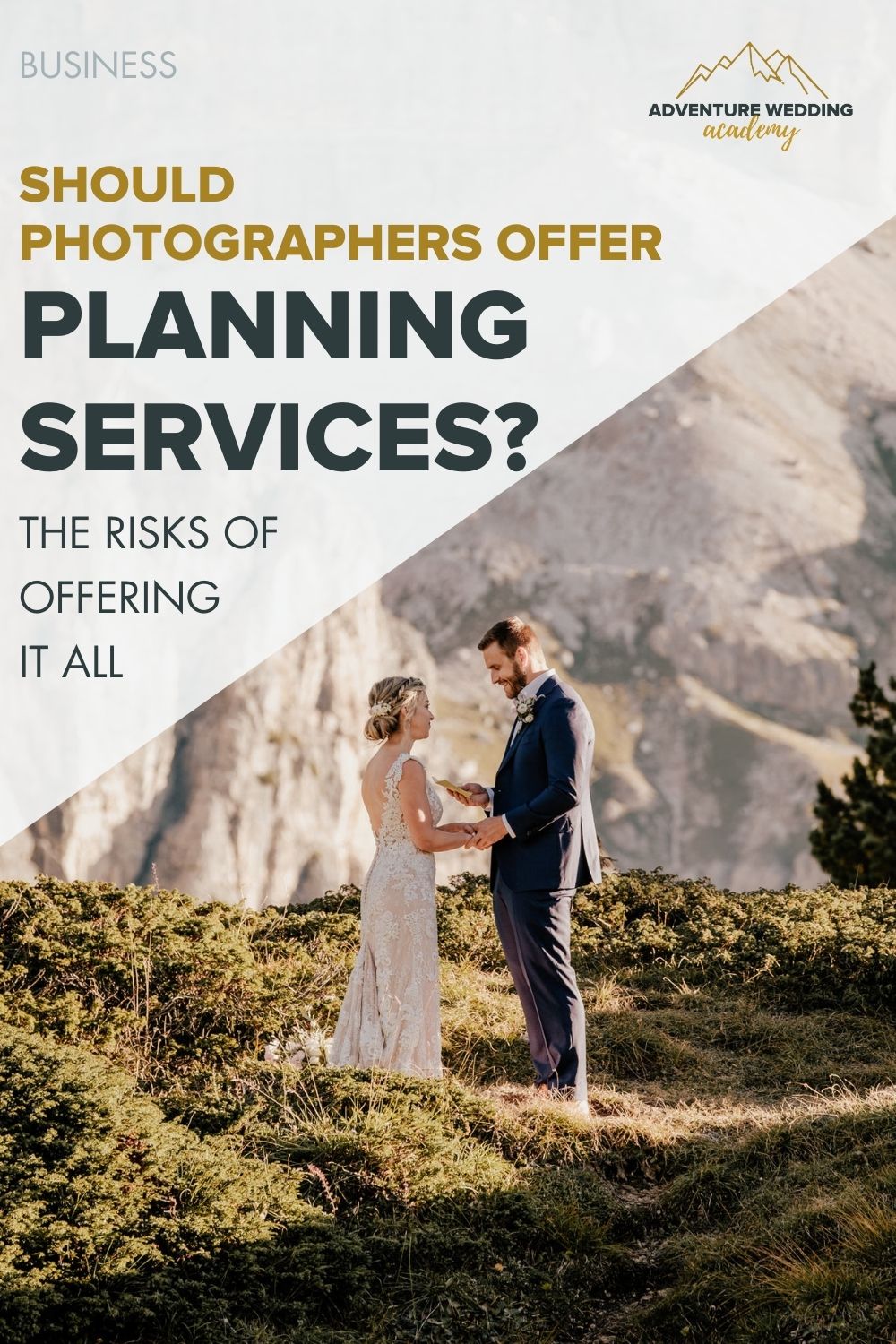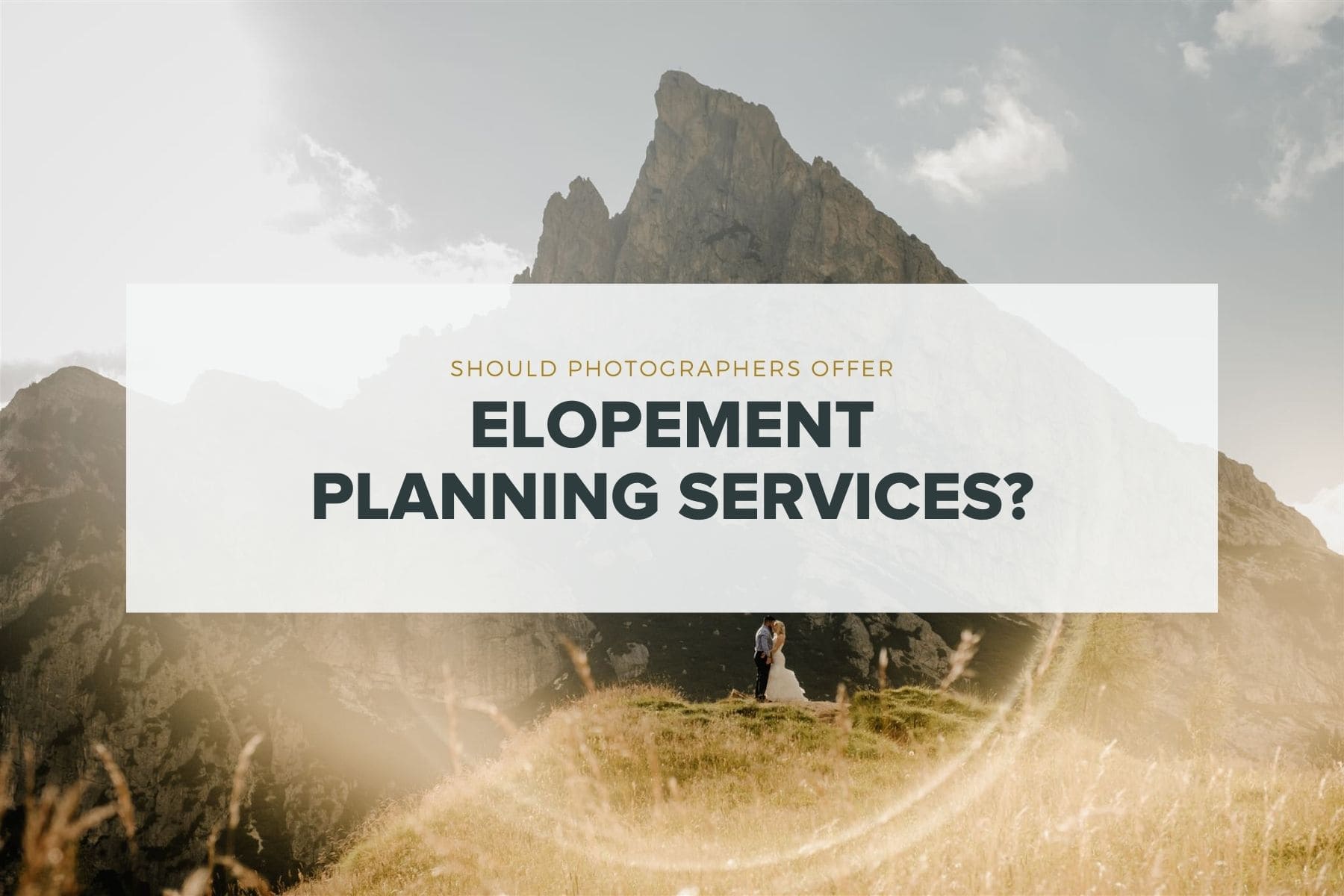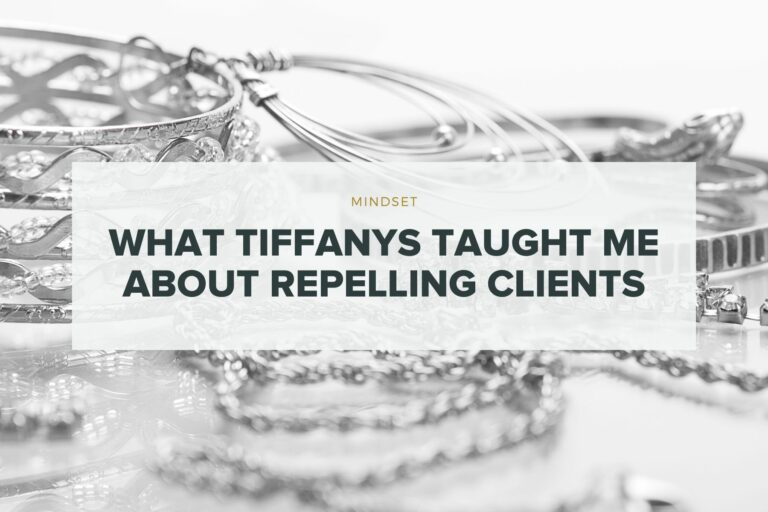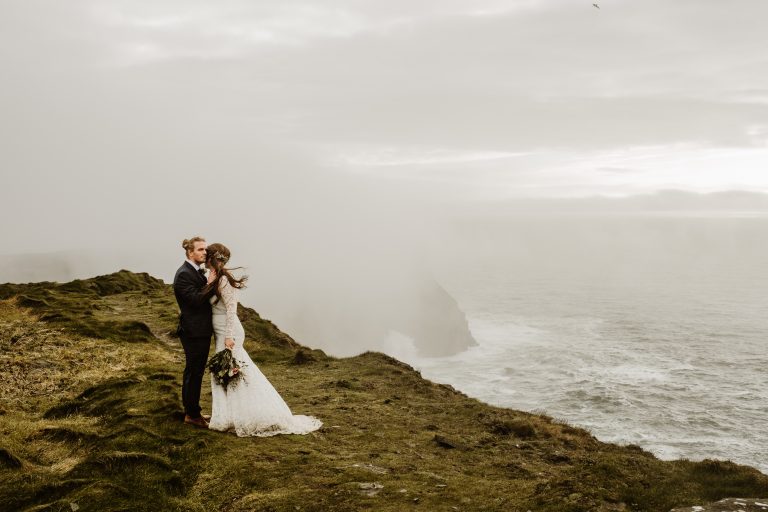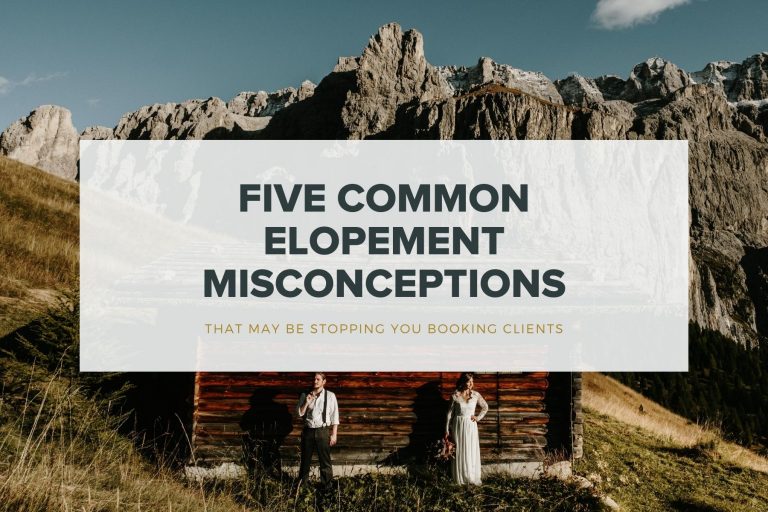10 Reasons Photographers Shouldn’t Offer Elopement Planning
There’s a new(ish) trend in the wedding industry, and more specifically in the elopement space, for photographers to offer elopement packages to couples that include planning assistance and the booking of other vendors services within that.
On the surface, this sounds great. A photographer can sell a much more expensive, “All Inclusive package”, the couple pays them a single, much higher fee, and they book all the vendors they like to work with and offer the clients a one-stop-shop for everything they need.
It sounds like a win-win situation for everyone (except maybe elopement planners). But there are actually lots of things to consider when thinking about whether you should (or are even allowed) to offer these additional services.

The risks of selling “All Inclusive” elopement packages that include planning services
If everything goes well, you shouldn’t have anything to worry about. Increased sales, happy clients. But sometimes things don’t go to plan, and then things can get pretty complicated. So let’s talk about the potentially problematic areas of selling “all-inclusive” elopement packages:
1. One Of The Suppliers That YOU Booked Cancels/Doesn’t Turn Up/Turns Up Late
You might be booking suppliers that you’ve worked with multiple times before, and perhaps they have always been great. But sometimes things happen, and they cancel at the last minute or just don’t turn up (family emergency, car breaks down, positive covid test!). Then what?
If you are the one responsible for the booking of other suppliers, it’s your job to find a solution and/or a replacement. And the consequences that arise from that.
If this situation happens before the wedding day, at least you’ve got time to deal with it. But if this happens on the wedding day itself and you’re supposed to be photographing the couple, you have to decide if you’re going to stop photo coverage in order to make calls and find a solution. You might have to re-schedule other vendors or events on the day as a result. All the time you’re on the phone and trying to sort out the problem, you’re not doing the main thing they hired you for – taking photos!
2. The Clients Aren’t Happy With One (or Multiple) Services & Want Refunding
As soon as clients are paying you for a service, and you are contracting other suppliers and handling the payments, there are financial & liability issues to consider. Who is responsible if the clients are not happy with the flowers and request a refund, who pays that?
If you’ve made a referral deal with other vendors, do clients know how much of their fee is allocated to things like flowers, HMUA, celebrant, musician etc? And how much is your fee for photography and for planning?
3. Cashflow Concerns
If clients are paying you for everything, and you are paying other suppliers, you need to think about your cashflow. When do the clients pay you and when do you pay the other suppliers? Do any of the suppliers require payments upfront or will they invoice after the wedding? Are there ones who prefer cash-in-hand and you’re responsible for carrying large amounts of cash to pay everyone on the wedding day?
What about if a supplier cancels last minute and you need to find a replacement, but the only one available charges double. Who pays for that?
4. Extra Taxes
More income means more taxes. Of course that’s not a bad thing if you are actually got to keep that money. If you are taking payments from clients and then paying other suppliers, you’re going to be taxed on that income, even if a chunk leaves you account again soon after. Depending on the country you live in, that could mean having to be VAT registered. If you are doing an all-inclusive package, make sure you know your numbers (taxes, profit margins etc).
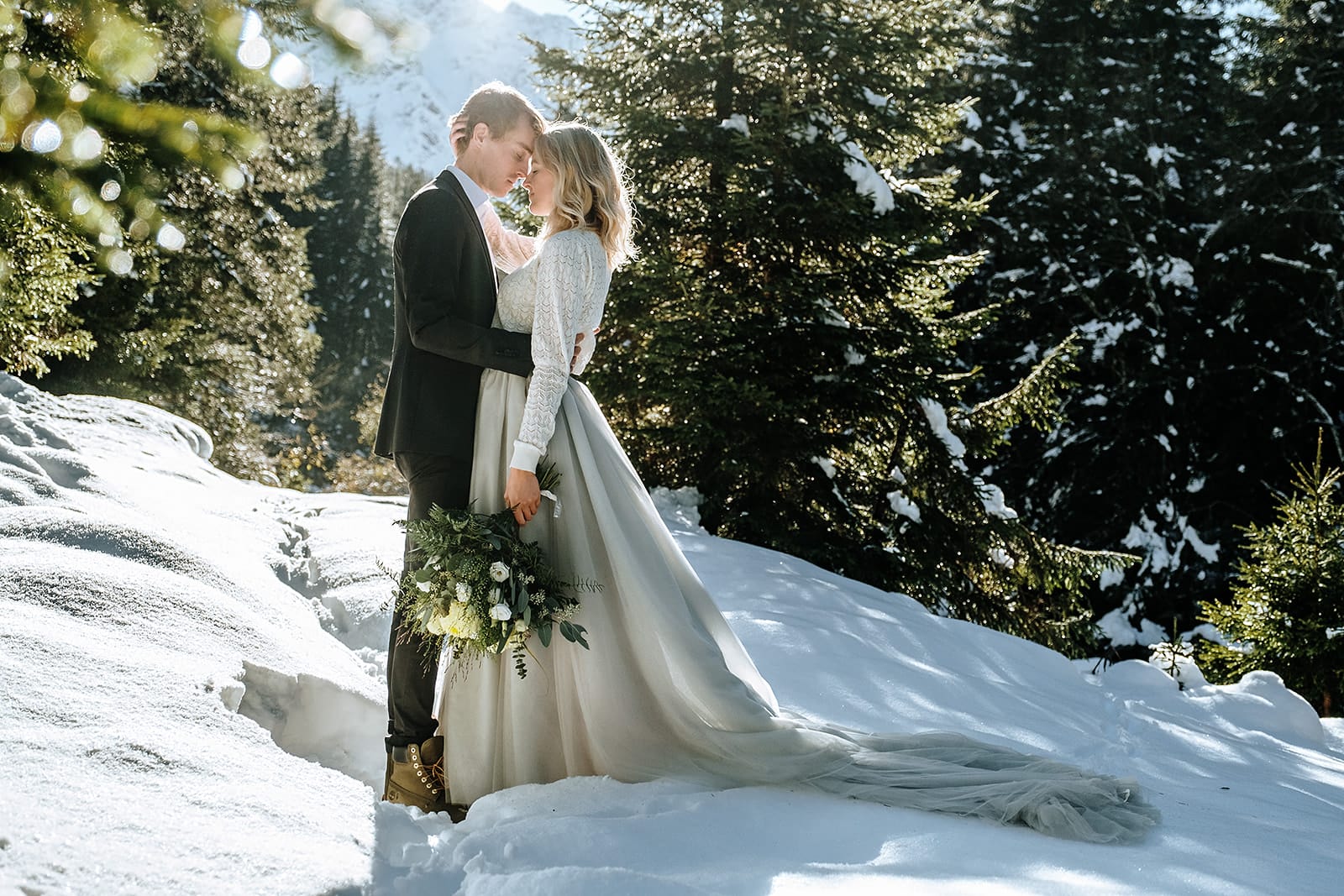
5. Client Cancellations & Postponements
The last couple of years of the pandemic have brought so many photographers a mountain of anxiety when it comes to cancellations and postponements. What was one a rare occurrence is now something that is happening reasonably regularly, and may still do for some time.
If clients cancel an all-inclusive package that includes photography, planning and the services of other vendors, what (if any) refunds would they be entitled to. What cancellation & postponement agreements do you have with the other suppliers?
6. Contracts
So many photographers have dealt with the issue of “gifted” photography, where someone else pays as a gift to the couple. Most photographers will still make their contract between them and the couple, as they are the ones being photographed.
If you’re offering more than photography, and you are the one hiring and paying other suppliers, who is their contract with? If the clients are only signing one contract, and it’s with you, are the clients aware what is, and isn’t included within the scope of the contract?
You could also find yourself in a grey area if you aren’t clear in the contract about what additional services they are getting besides photography and all the limitations and liability related to those other services.
Once you’ve amended your contract to cover packages, you’ll definitely want to get a lawyer to look over it.
7. Business License Restrictions – You May Not Legally Be Allowed To Plan
There are some countries where you can pretty much call yourself anything (well almost anything) and create whatever packages you want.
But before you fully launch into all-inclusive elopement packages, especially if you live in Europe, you may find out that you aren’t actually allowed to.
For example, when I had a meeting with a lawyer in Austria, I found out that I couldn’t offer all-inclusive package packages, even if I wanted to, because it’s outside of the scope of my business license. To offer planning services, I would need to be a wedding planner – and have the appropriate business registration. There are also restrictions for creating packages that include anything related to travel – only a travel agency can do this and that’s also a different business registration. As a photographer with a business in Austria, I can only offer services related to photography (unless I obtain the appropriate licences to offer more). It’s also why you need to be careful if you use the term “guide” to describe yourself, as it’s a protected profession in a number of EU countries (but that’s another conversation).
So if you want to offer these packages, check if there are any restrictions as to what you can and cannot offer.

8. Burning Bridges With Planners
I’ve seen rants in Facebook groups before where a videographer has offered to take photos and photographers get MAD. It can feel like people are stepping on each others’ toes and it doesn’t feel nice. It’s no different for planners when photographers start offering to plan an elopement.
There are some incredible elopement planners that I work with, some who specialise in elopements and micro-weddings. They are incredible at what they do and do so much work behind the scenes that most people ever realise. They are also the ones solving emergencies on a wedding day when a helicopter company tells you on the morning of the wedding that they don’t have a heli available (this happened and the planner got it fixed and the couple never knew). They are the ones working out a backup plan when the celebrant tells you at the last minute that they have broken their leg, can’t walk and it’s supposed to be a snowshoe elopement (also a true story).
When photographers are offering to take on the role of a planner, it’s taking away work from planners. Sustainability isn’t just about recycling and leave no trace. Economic sustainability means earning without talking away the opportunities of others to earn too.
And let’s face it, if you’re had a referral relationship with a planner in the past, or you are trying to move into a new location and build contacts, offering planning services yourself is probably not going to put you at the top of their referral list when they need a photographer. But if you send referrals to planners, they are more likely to send them to you too.
9. Liability & Insurance
Kinda related to a few points above, what if a client really isn’t happy with something and wants compensation, perhaps it even ends up in the hands of lawyers. Would your photography business insurance cover this if it’s not related to your services as a photographer? It might be worth checking what you are insured for.
It might not feel like it’s your fault if they have no officiant because they tested positive for covid and now can’t get legally married and they fly out tomorrow. But if you are the one who they booked everything through, then the liability probably lies with you, because they paid you. And even if it’s not your fault, it’s not a nice conversation to have with a couple.
If you go down this route, you may want to look at being a limited company (LLC or Ltd) so that the risks to you personally are reduced. Although with being a limited company comes more taxes too yay!
10. Essentially, You Are Responsible For EVERYTHING
With all-inclusive packages, you’re responsible for everything. And if something doesn’t go as planned, or they don’t like what one of the other suppliers delivers, even if they don’t ask for a refund and just complain, no matter how amazing your photos end up being, it can still taint the experience they have had with you and have them walking away from their wedding day being less than satisfied. Do you want to take that additional risk?
***
So what do you think? Had you considered all the risks and complications that can arise from offering planning services and all-inclusive packages for elopements? Do you still want to offer them?
